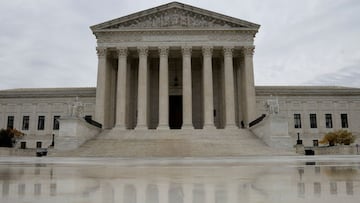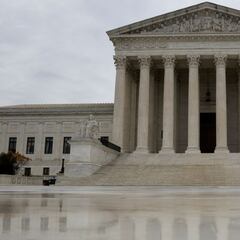What has the Supreme Court ruled about the Texas abortion ban?
Despite refusing to rule out the ban, the court has decided lawsuits can be brought against the legality of the law itself.


The Supreme Court ruled on Friday morning that lawsuits against the state of Texas' new abortion law can proceed, setting up a showdown in court against the legality of the restrictive rules. However, the state abortion law is allowed to persist even as legal challenges have been brought against it.
The Supreme Court has in effect decided with the Texas lawmakers twice in upholding the ban, although this has not been made explicit. CNN legal analyst Jeffrey Toobin said Friday, "[Abortion] is a constitutional right that has been recognized since 1973, since Roe v Wade. And the Supreme Court has said, now twice, that it's OK for Texas to take away this right from women," he said.
"I think that is a very clear message of where they're heading on the Mississippi case."
Related news:
- What is the difference between an abortion pill and Plan B?
- What is Roe v Wade in law? What happened in 1973?
- When will the Supreme Court rule on abortion verdict?
- What is the Mississippi abortion law?
What is the Texas abortion law?
The legislation is known as Senate Bill 8 and was pushed through the Republican-led Texas state legislature before being signed into law by GOP Gov. Greg Abbott in May. It is a new interpretation of the ‘heartbeat bills’ that are often forwarded by anti-abortion groups in order to prevent abortions once embryonic cardiac activity is detected.
While SCOTUS has allowed challenges to SB 8 to proceed, it's outrageous that the Court has again decided not to block Texas' unconstitutional abortion ban. More Texans are harmed every day this law is allowed to stand. The Senate must pass the Women's Health Protection Act.
— Elizabeth Warren (@SenWarren) December 10, 2021
At six weeks, ultrasound scanners can detect the group of cells that will become the heart as they produce their first electrical pulses. However, this does not constitute a heart. "Fetal" heartbeat makes even less sense as a moniker, as unborn babies are not called a fetus until the eight week of pregnancy. At this stage they are known as an embryo.
Although a lot of political decision weighs upon the detection of this pulse, "by no means does it translate to viability of the heart or viability of the pregnancy," says Dr. Saima Aftab, medical director of the Fetal Care Center at Nicklaus Children's Hospital in Miami.
Will the Supreme Court ruling affect this law?
Related stories

What is the difference between an abortion pill and Plan B?

What is Roe v Wade in law? What happened in 1973?
A study from the University of Texas found that the strict new restrictions would prevent around 85% of women from receiving access to abortion care. There are no exceptions offered in instances of rape or incest. This has led to a 50 percent drop in the number of abortions in the state, as people have fled outside state borders to have the procedure completed.
Judge rules citizen enforcement of Texas abortion law unconstitutional https://t.co/uxZNjCeHso pic.twitter.com/IetyWfS9hQ
— Reuters (@Reuters) December 10, 2021
The prospect of these lawsuits means there are more challenges for those in the Lone Star state who are trying to restrict abortion, without stopping the law itself.